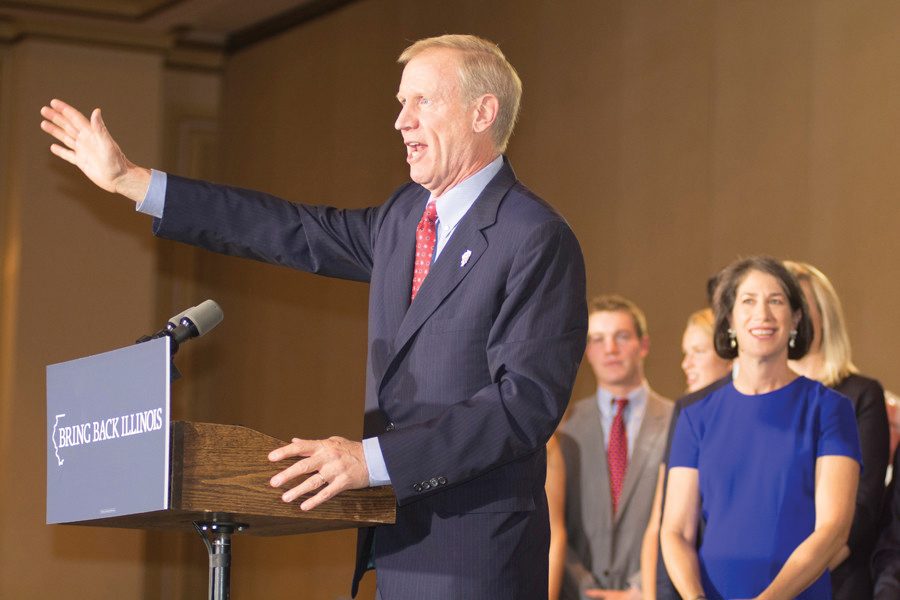Illinois Supreme Court rejects redistricting referendum
Daily file photo by Paige Leskin
Gov. Bruce Rauner speaks to his supporters after he was elected governor of Illinois on Nov. 4, 2014. Rauner’s plan to put a redistricting referendum on the ballot was shot down by the Supreme Court of Illinois.
September 20, 2016
The attempt backed by Gov. Bruce Rauner to put on the Illinois ballot a referendum that would ask voters to allow a possible redrawing of district boundaries was shot down and rejected a future rehearing last week.
The ballot proposal, which the court rejected on Sept. 13, would have asked voters to alter the 1970 Illinois constitution. Rauner pushed the proposal, saying he wanted to protect against gerrymandering.
Following the court’s 4-3 ruling, Rauner called on the Illinois General Assembly to take matters into their own hands to address term limits and independent redistricting.
“Today’s court decision to deny Illinoisans the right to vote on a redistricting referendum does nothing to stem the outflow or change people’s views of how the system is rigged and corrupt,” Rauner said in a statement. “Politicians should not pick their voters by drawing spaghetti-like district lines with the sole intent of keeping one party in power regardless of how the people vote.”
Justice Thomas Kilbride wrote in his decision that the petition is problematic because it designates the general auditor responsible for application process. The auditor would have control over the panel that picks those redistricting the 118 House and 59 Senate seats. His decision said because the general auditor is not mentioned in Article IV of the constitution, which deals with districting, the petition is therefore unconstitutional.
“This court is obliged to respect the limitations placed on the scope of ballot initiatives,” Kilbride wrote.
The dissenting argument written by Justice Robert Thomas states the court failed to save Illinois citizens from a rigged voter system.
“Today, a muzzle has been placed on the people of the state and their voices supplanted by judicial fiat,” Thomas wrote.
For Cook County Commissioner Larry Suffredin, the decision didn’t come as a surprise, criticizing drafters of the referendum for not following Circuit Judge Mary Mikva’s advice. Mikva essentially outlined for lawmakers a constitutionally sound petition in a decision two years ago, Suffredin said.
“From a legal point of view I don’t think it is a bad decision, and I don’t think it is a political decision,” Suffredin said. “I’m open to anything that would bring fundamental fairness to redistricting. We should be able to figure out how to write it so it stays on the ballot.”
Suffredin said the districts he represents, including Evanston and Skokie, would not see much change from redistricting.
Because of the North Shore’s democratic makeup and less racial diversity, Suffredin doesn’t believe elected officials or the community will see an altering voter representation.
Moving forward, Suffredin said if lawmakers continue to prevent gerrymandering through a referendum, they must strictly follow the Illinois Constitution.
“The lesson to be learned is that Kilbride again has given a road map of the future and if you are going to do it this way, you need to follow the road map exactly,” Suffredin said. “You can’t deviate a little.”
Nicholas Stephanopoulos, an assistant professor of law at the University of Chicago — known for writing about the efficiency gap, a statistical measure of gerrymandering — said on the surface, the Illinois case seemed like an easy one for lawmakers to pass.
“The Illinois case should be an easy one,” Stephanopoulos said. “All the litigants are asking the court to do is stay out of the process and let the measure go on the ballot. It’s really unfortunate that what should have been an easy case, the court stopped from even having a vote.”
Email: [email protected]
Twitter: @samkrevlin


